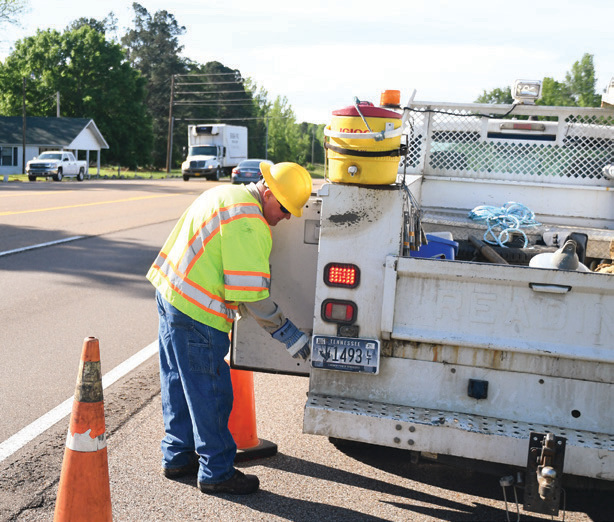
No one could have predicted that the 33-year-old journeyman lineman would lose his life that day. Yet the accident that resulted in his death could easily have been avoided. It happened in Washington state. The victim was working as part of a six-person crew installing a utility pole at the intersection of two rural county roads — a location similar to many electric cooperative service areas across Tennessee.
An impaired driver drove past the work zone signage (ignoring a flagger), crossed into the opposing traffic lane and plowed right into the work site. After contacting the hood and windshield, the victim was thrown over the top of the vehicle and struck his head on the asphalt pavement. He was airlifted to a trauma center and died of his injuries 10 days later.
This young man never made it back home to his family that day — all because someone failed to respect the clearly marked space in which he was working.
Electric cooperative line crews place themselves in vulnerable positions every day, doing what they must in order to keep the lights on for you and me. They can obey all the rules, wear their personal protective equipment, take precautions to ensure proper visibility, follow all the steps to set up a safe and clearly marked work zone … and still be at risk from irresponsible motorists.
Tennessee’s Move Over Law is designed to protect folks who might find themselves working along our state’s roadways as part of their job performance. This includes operators of emergency vehicles, tow trucks, highway maintenance vehicles, solid waste trucks and (near and dear to my heart, not surprisingly) utility vehicles. The law requires that motorists move over to an adjacent lane of traffic and/or slow down. With a maximum fine of $500 for violating this law and the likelihood of up to 30 days in jail, you’d think that people would adhere to a rule intended to save lives. But the sad fact is the Move Over Law is regularly flouted by irresponsible drivers — and no less than the safety and wellbeing of our line crews are at stake when this occurs.
The circumstances vary, although none of the reasons for ignoring the law is valid. Perhaps you’re in a hurry to get somewhere, or maybe you’re simply not paying attention. You may be driving along a busy highway, or perhaps you’re on a rural backroad. It may be the middle of the day, at twilight or on a foggy morning. But regardless of the weather conditions or the location, keep in mind that for that moment in time, in that place, you are entering someone’s workspace. And if you do so at a high rate of speed or without allowing proper distancing, you can be endangering a life.
There are things we can all do to make our roadways safer places to work. Keep an eye out for those orange cones and barrels. Watch for signs indicating work crews ahead. Pay close attention to flaggers, and wait your turn to proceed. Yield to oncoming traffic, and give work vehicles a wide berth. And as you drive past these locations, remember that the folks who are performing their jobs in these roadside work zones are there for the benefit of all of us.
They deserve our respect — and our consideration.



